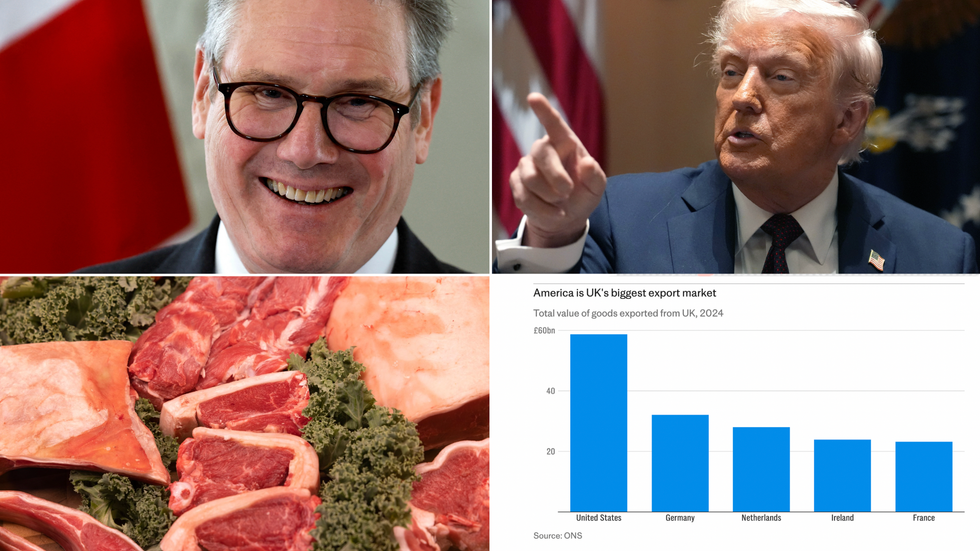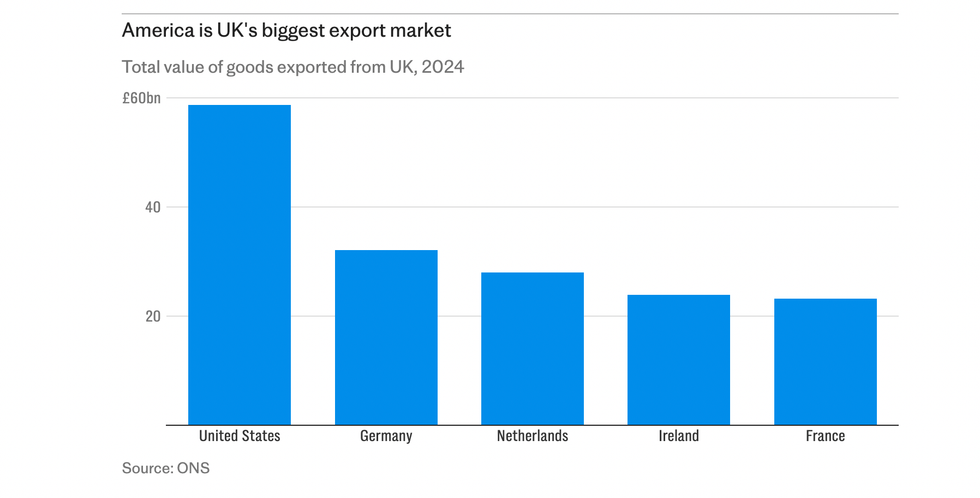Gareth Davies says retaliating to US tariffs risks a free trade agreement …
GB News
Keir Starmer's frantic bid to shield the British economy from the US President's 'Liberation Day' tariffs appeared to pay off - but at what cost?
Don't Miss
Most Read
Trending on GB News
Sir Keir Starmer's 11th-hour bid to strike a deal with Donald Trump ahead of his "Liberation Day" tariffs appeared to bear fruit as the President imposed the lowest level of levies on the UK, applying only a 10 per cent tariff on most British goods.
Meanwhile, in a major win for Brexit Britain, the EU received double the rate of its neighbour, with a 20 per cent retaliatory levy.
The reciprocal rates are determined by comparing each country's goods trade surplus with the United States to the total amount they export to the world's largest economy.
This simple logic might explain why Britain got off lightly: the US is our biggest export market and second-largest import partner for goods so we run a huge trade surplus.
However, there are growing fears that Starmer might have thrown in an added sweetener behind the scenes that benefits the US while actively harming domestic industries.

Keir Starmer's frantic bid to shield the British economy from the US President's 'Liberation Day' tariffs risks hobbling domestic industries
Getty Images/ONS
What concessions did Starmer offer and how might they negatively impact domestic industries?
Reports indicate that a deal is on the table that encompasses areas like artificial intelligence and other emerging technologies, with an additional proposed concession related to agricultural imports.
Let's look at the technology concession first. Starmer has suggested significant tax cuts for large American technology firms, such as Amazon and Apple, aiming to reduce the scope of the UK's Digital Services Tax (DST) that currently imposes a two per cent levy on revenues of certain digital businesses.
This tax generates approximately £800million annually for the UK. The proposal seeks to alleviate tensions with the US administration and potentially deter the imposition of harsh tariffs on UK exports.
It's worth noting that Trump is not an outlier in his criticism of DSTs. Silicon Valley bigwigs have long viewed these taxes as discriminatory against American technology companies, thereby creating an uneven playing field in the global market.
However, the Liberal Democrats warn that Starmer's sweetener will hurt the most vulnerable in British society as it could disproportionately benefit wealthy tech executives while unfairly shifting financial burdens onto disabled individuals and lead to public sector job losses at a time when Rachel Reeves takes an axe to the welfare system.
Ed Davey, the party’s leader, told his spring conference: “Now Labour’s even talking about scrapping Britain’s tax on social media giants. Well, appeasement never works with bullies, and it doesn’t work with Trump. And you can see that he’s already put his tariffs on British steel.”
Treasury spokesman Daisy Cooper echoed this warning, saying: “Cutting taxes for US social media giants would be an insult to people with disabilities and carers seeing their support slashed by this government.
Selling out British agriculture?
The other big concession that Starmer is reportedly considering modifying existing tariffs on American agricultural products coming into the UK.
LATEST MEMBERSHIP DEVELOPMENTS
- MAPPED: The six councils slapping highest tax rises on Britons - and the salaries of their town hall bosses
- It is not an accident that the crime rate is on fire in Britain...it is deliberate - Alex Story
- Fix Britain first!’ Eight INSANE projects that YOUR tax money is going on as calls for UK DOGE grow louder

The US is the UK’s biggest export market and second-largest import partner for goods, according to the Office for National Statistics (ONS)
ONS
While specific details are pending, the mooted proposal is to reduce tariffs on meat imports, such as beef and chicken, which currently range from 12 per cent to 16 per cent to appease US trade demands without compromising the UK's stringent food safety standards.
The goal is to secure reciprocal adjustments from the US, facilitating easier meat exports from the UK to America while also allowing US farmers greater access to the British market.
This move, however, has sparked a backlash among UK farmers, who are already riled by recent inheritance tax changes that could force many to sell their businesses.
The National Farmers' Union is warning Starmer against kowtowing to Washington on agriculture.
The National Farmers' Union (NFU) President Tom Bradshaw told The Telegraph: “If we’re giving up access to our market, then it needs to be reciprocal. If it’s a one-way deal, that is something the industry will have a problem with.”
He stressed that any dilution of UK standards must be a "red line" in negotiations.
A senior government source confirmed that the UK is standing resolute on maintaining its regulatory framework, ensuring that chlorinated chicken continues to be prohibited.
Is the pain worth it?
The UK stands to be notably affected by Trump's latest round of tariffs as the US is our biggest export market and second-largest import partner for goods, according to the Office for National Statistics (ONS).
He's already announced 25 per cent of tariffs on steel, aluminium and vehicles coming into the US. With almost one in five British cars sold overseas, these escalatory tariffs are expected to be hugely disruptive.
Goldman Sachs analysts have warned that the UK's GDP will take a larger hit than previously expected, even if a UK-US trade deal is secured.
This is due to “larger negative spillovers” from tariffs imposed on the European Union, which could disrupt supply chains and reduce overall trade volumes.
The Office for Budget Responsibility (OBR) has indicated that the tariffs proposed by Trump could potentially eliminate the £9.9billion fiscal headroom Chancellor Rachel Reeves managed to claw back in her Spring Statement.
Professor David Miles, a member of the OBR's Budget Responsibility Committee, informed the Treasury Committee that if tariffs of 20-25 per cent were imposed on the UK and maintained over a five-year period, they could "knock out all the headroom that the government currently has".








